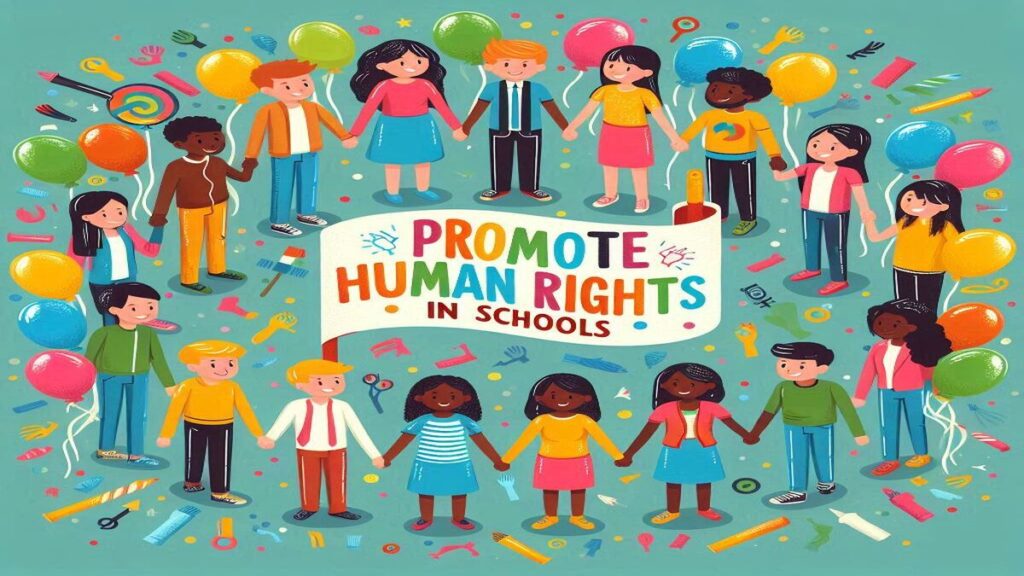How to Promote Human Rights in Schools: (human rights education, rights in schools, student empowerment, respect in education, child rights advocacy, human rights curriculum, teaching empathy, social justice in schools, diversity and inclusion education, fostering global citizenship, compassionate school culture, teacher training for human rights, peer mentoring for empathy, building respectful environments, promoting equality in schools) Learn effective ways to promote human rights in schools! Discover practical methods to help students understand, respect, and advocate for human rights, fostering a more compassionate and productive learning environment.
Introduction
Promoting human rights in schools goes beyond just adding it to the curriculum—it’s about creating a culture where students feel empowered, respected, and responsible. Schools play a crucial role in shaping young minds, so instilling values around human rights early can have a lifelong impact. Did you know that students who feel respected are not only more engaged but often show a 20% increase in academic performance? I’ll share with you some powerful, real-world strategies to foster an environment where human rights thrive, preparing students to excel academically and become responsible, empathetic global citizens.
How to Promote Human Rights in Schools:
Understanding the Importance of Human Rights in Schools
- Discuss why human rights education matters in building responsible, empathetic individuals.
- Explore how understanding human rights can increase students’ confidence and willingness to speak up.
- Share data or case studies linking respect for human rights to higher student productivity and mental well-being.
Creating a Rights-Respecting School Culture
- Tips on building a school environment that naturally respects every student’s rights, from fair policies to equitable treatment.
- Real-world examples of how respect in daily interactions boost students’ motivation and attendance.
- A personal note: I’ve seen respect in schools encourage students to take ownership of their learning.
Incorporating Human Rights Education into the Curriculum
- Ideas for integrating human rights topics into various subjects like history, literature, and social studies.
- Examples of successful human rights programs and their positive effects on students’ understanding and engagement.
- Highlight how interactive teaching methods (like role-plays or debates) not only help students learn but also make the lessons memorable.
Encouraging Student-Led Initiatives
- Practical ways to empower students to advocate for human rights through clubs, projects, and events.
- Real-life success stories of students making a difference in their schools and communities.
- Tips on how student initiatives can help build leadership, empathy, and teamwork skills.
Training Teachers to Foster Human Rights Awareness
- Overview of training programs to equip teachers with human rights knowledge and teaching skills.
- Discuss how a rights-aware teacher can improve classroom dynamics and student productivity.
- Examples of data on improved teacher-student relationships after implementing human rights training.
Collaborating with Parents and the Community
- Strategies to engage parents and community members in promoting human rights in the school.
- Examples of school-community partnerships that have enriched students’ human rights education.
- Real-life story: How a community-based approach to human rights education deepened students’ engagement.
Measuring the Impact of Human Rights Education in Schools
- Methods for assessing the success of human rights programs in fostering awareness and empathy.
- Discuss potential metrics such as behavioral changes, student feedback, or improved conflict resolution skills.
- Highlight how ongoing evaluations can ensure effective programs meet students’ evolving needs.
Conclusion
Creating a culture of human rights in schools is a meaningful journey, but the results are well worth it. When students are taught to understand and respect human rights, they not only become more compassionate but also develop essential life skills, from critical thinking to resilience. These values foster a more productive school environment and help mold responsible future citizens. Let’s all contribute to building a world where every student feels respected and ready to make a positive impact. Ready to start promoting human rights in your school? Small steps make a big difference!
